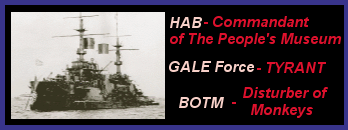It easily could have had the attacking Japanese pilots been some of the best in the world, ever. In other actions Japanese land based attack bomber proved dramatically less effective at attacking surface ships. What’s more the Japanese had only enough torpedoes in Indochina to fly one mission, had they failed they could have followed up only with level bombing attacks.petesampras wrote:
PoW was unlucky? Come on. You think that battle could have ended in anything other than a Japanese victory?
As it was Repulse successfully evaded 19 torpedoes, and Prince of Whales would have done far better had she not taken a torpedo hit in the shafts early on. It is quite possible that one ship or even both could have survived. If they’d had even token fighter cover, fighters arrived just as the ships sank, or a more realistic sized escort force they almost certainly would have done much better.
The Royal Navy had been subject to heavy air attacks from April 1940 onward, and up to December 1941 it had lost nothing larger then a light cruiser, despite a number of hits on its battleships and carriers. Even then most of the sinking’s came only after incredibly protracted attacks. The aircraft did have the warship beat in WW2, but the results of the Battle off Malay are not typical.
That’s not really true, especially the ‘as built’ bit. The new US battleships did have a greatly superior heavy anti aircraft armament as built, but without proximity fuses no such weapon was all that effective. However in terms of automatic antiaircraft guns the US standard in 1941 was substantially inferior to that of the Royal Navy. In late 1941 the US had only two new battleships, North Caroline and Washington, each of which had just four quadruple 1.1in mounts and twelve to eighteen single mounted. 50cal machine guns; which had almost no value at all.
Now, US battleships are another story. They were built with far superior AA to anything seen before. I'd have to look it up, but in the one confrontation between a new US BB and a heavy air attack, the US ship won handily.
In contrast at the time of sinking Prince of Whales had six eight barrel 2pdr (40mm caliber) mounts, one 40mm Bofors gun and eight 20mm guns. Repulse had three eight barrel 2pdr mounts, four quad .50cal machine gun mounts and eight 20mm guns.
US ships did receive massive additions of new 40mm Bofors and 20mm Oerlikon guns (a weapon adapted from the RN, the 40mm was adapted based on its use by the Dutch) in 1942-43 but this was in response to war lessons such as the sinking of Prince of Whales and Repulse! These huge masses of anti aircraft guns left most US ships with stability problems as they had NOT been designed to accept them. In fact stability and top weight was such a problem that some US battleships had to remove armor from the 5in turrets as compensation, and ironically this was done such as the kamikaze attacks made the armor more important then ever.
I am not aware of any time US battleships were subject to air attack without fighter cover, even at Pearl Harbor some fighters got off the ground. Fighter cover, even token fighter cover will prevent the enemy from making coordinated torpedo attacks which vastly increases a ships chance of survival.
The example of US battleship AA firepower you probably thought of was South Dakota at the Battle of Santa Cruz. She was officially credited with 26 kills on this day, a record for any ship, though one was almost certainly a friendly, and it’s certain that the total was an exaggeration. South Dakota had literally just been refitted with 68 x 40mm guns and about 30 x 20mm guns before steaming for the South Pacific. She in no way reflects the capacities of US ships in 1941. What’s more few Japanese planes actually attacked her; they went after the nearby carrier Enterprise, which had also just gotten a massive increase in AA firepower. Still, one Val did hit the battleship with a 250kg bomb. It landed on a turret top and causes some casualties, but virtually no damage.
The Royal Navy likewise greatly improved its own automatic weapons batteries from 1942 onward, though it’s heavy anti aircraft guns suffered from poor director control through most of the war. By 1945 Duke of York, same class as Prince of Whales, had 88 x 2pdr guns in 14 quad and octuple barrel mounts, 8 x 40mm Bofors guns in two quad mounts and 55 x 20mm Oerlikon guns in twin and single mounts. This is actually more automatic weapons barrels then any US battleship had, though the effectiveness of the 2pdr gun was less then that of the 40mm Bofors (despite nearly the same shell weight and same caliber) owing to higher rate of fire and higher velocity.
Remember that in the end the battleship did not die off because it was vulnerable, even the best protected carrier was much more vulnerable, but rather because it had vastly less ability to inflict damage on the enemy. Even the best radar directed naval gunfire just could not compete with the 200nm or more striking radius of carrier based bombers.


